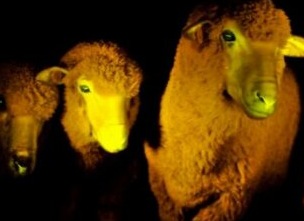
This is a placeholder text
Group text
by Mindhunt on 04 June 2013 - 14:06
Read the link BE4U provided and it seems more research has found gene markers for the GMO foods in animal and human tissues via ingestion. The GMO genes are binding with animal and human genes and altering how these genes are expressed. Now here is the scary court case for me (I have a friend who is a brilliant geneticist and who works with human genes in her research of finding links in how the chromosomes for sex influence embryonic/fetal development). She sent me the information on a VERY important Supreme Court case that I am wondering how many of you were aware of and of the far reaching ramifications of any decision (expected this month or next)?
Association for Molecular Pathology v. Myriad Genetics
The case is asking whether human genes can be patented, specifically the two genes that are used in diagnostic tests to estimate cancer risk. AMP says no one can patent "products of nature" as they are not inventions. Myriad says it can because they "isolated" the gene from human tissue. Now if a human gene is "isolated" from human tissue without being altered, isn't it still a product of nature? Hmm (the slippery slope is how far can gene patenting go). Do you know that when you agree to a blood test at a diagnostics lab, doctor's office, or hospital, you sign away rights to that genetic material. It is common for blood not used for diagnostic testing to be given for genetic testing for research. What would happen to you if it was found in one of these routine tests that you had a gene that kept you from getting any form of cancer (cancer is just the gene that lost its "off" switch and keeps replicating, think copying a copy over and over, you lose much of the clarity as genes lose much of the accuracy during repeated replications, a very simplistic explanation and I apologize to geneticists). Some lab isolates your cancer proof gene and patents it. If the Supreme Court decides that genes can be patented and that anything that includes the genetic markers of the patented gene belongs to the company, can your genetic material belong to a company? If you are asking yourself if this can happen, remember - gene patents include intellectual property of anything that has the patented gene markers and that includes any plants and animals who are showing the patented gene markers, they can already own any animals bred with genetically engineered animals, the offspring become intellectual property. Many geneticists feel this is a "slippery slope" case.
*Robin Cook already wrote about this in a sobering book on how far a genetics company went to get its "intellectual property" (a person) under its control
Association for Molecular Pathology v. Myriad Genetics
The case is asking whether human genes can be patented, specifically the two genes that are used in diagnostic tests to estimate cancer risk. AMP says no one can patent "products of nature" as they are not inventions. Myriad says it can because they "isolated" the gene from human tissue. Now if a human gene is "isolated" from human tissue without being altered, isn't it still a product of nature? Hmm (the slippery slope is how far can gene patenting go). Do you know that when you agree to a blood test at a diagnostics lab, doctor's office, or hospital, you sign away rights to that genetic material. It is common for blood not used for diagnostic testing to be given for genetic testing for research. What would happen to you if it was found in one of these routine tests that you had a gene that kept you from getting any form of cancer (cancer is just the gene that lost its "off" switch and keeps replicating, think copying a copy over and over, you lose much of the clarity as genes lose much of the accuracy during repeated replications, a very simplistic explanation and I apologize to geneticists). Some lab isolates your cancer proof gene and patents it. If the Supreme Court decides that genes can be patented and that anything that includes the genetic markers of the patented gene belongs to the company, can your genetic material belong to a company? If you are asking yourself if this can happen, remember - gene patents include intellectual property of anything that has the patented gene markers and that includes any plants and animals who are showing the patented gene markers, they can already own any animals bred with genetically engineered animals, the offspring become intellectual property. Many geneticists feel this is a "slippery slope" case.
*Robin Cook already wrote about this in a sobering book on how far a genetics company went to get its "intellectual property" (a person) under its control
by Two Moons on 04 June 2013 - 15:06
Where did I leave that noisy cricket?
We need a tool to remove the sickness from the herd.
Soylent Green is people !!
Nothing's free in Waterworld.
We need a tool to remove the sickness from the herd.
Soylent Green is people !!
Nothing's free in Waterworld.
by GSD Lineage on 10 June 2013 - 20:06
GMO Sheep AKA ( Glow in the Dark Sheep) Jelly fish/ Sheep Cross
Will see how pedigree database handles this and the clones when they start doing that in dogs.
Horizontal gene transfer... Across species

.
by Mindhunt on 15 June 2013 - 20:06
Supreme Court ruled that naturally occurring human, animal, plant, or microbial genes can not be patented, however, edited and/or artificially created DNA can be. Artificially created DNA called cDNA (complementary DNA) that is not found to occur naturally, can be patented. Going to be interesting.....
by radarsmom on 16 June 2013 - 23:06
As I read this thread, I recall the myth of Icarus . . . . science is enabling us to fly too high, and we should take care lest our wings melt . . .
by joanro on 17 June 2013 - 16:06
They've already melted and sent us into a tailspin, which is going to take Chuck Yeager to pull us out of.....
Come to think of it, even Mr. Yeager won't be able to right this doomed ride.
by Two Moons on 18 June 2013 - 14:06
I think Chuck's a bit too old to be flying anything these days.
What science does is often short sighted and or better yet limited in it's vision.
And science is as much a slave to money as anything else, break through's take funding.
Money sets the course of science, big surprise there.
I don't see any of it as a blessing, but rather sometimes a curse that once loosed cannot be taken back.
I think many of the better discoveries were by accident or were a side effect of something else.
They should always ask, do the benefits out weigh the risks.
They do not most of the time, and GMO's are a perfect example of that.
What science does is often short sighted and or better yet limited in it's vision.
And science is as much a slave to money as anything else, break through's take funding.
Money sets the course of science, big surprise there.
I don't see any of it as a blessing, but rather sometimes a curse that once loosed cannot be taken back.
I think many of the better discoveries were by accident or were a side effect of something else.
They should always ask, do the benefits out weigh the risks.
They do not most of the time, and GMO's are a perfect example of that.
by GSD Lineage on 18 June 2013 - 14:06
The benefits to who?
2moons
said:
2moons
said:
| They should always ask, do the benefits out weigh the risks. |
by Two Moons on 18 June 2013 - 14:06
Who or what, it's all the same difference.
Contact information Disclaimer Privacy Statement Copyright Information Terms of Service Cookie policy ↑ Back to top




